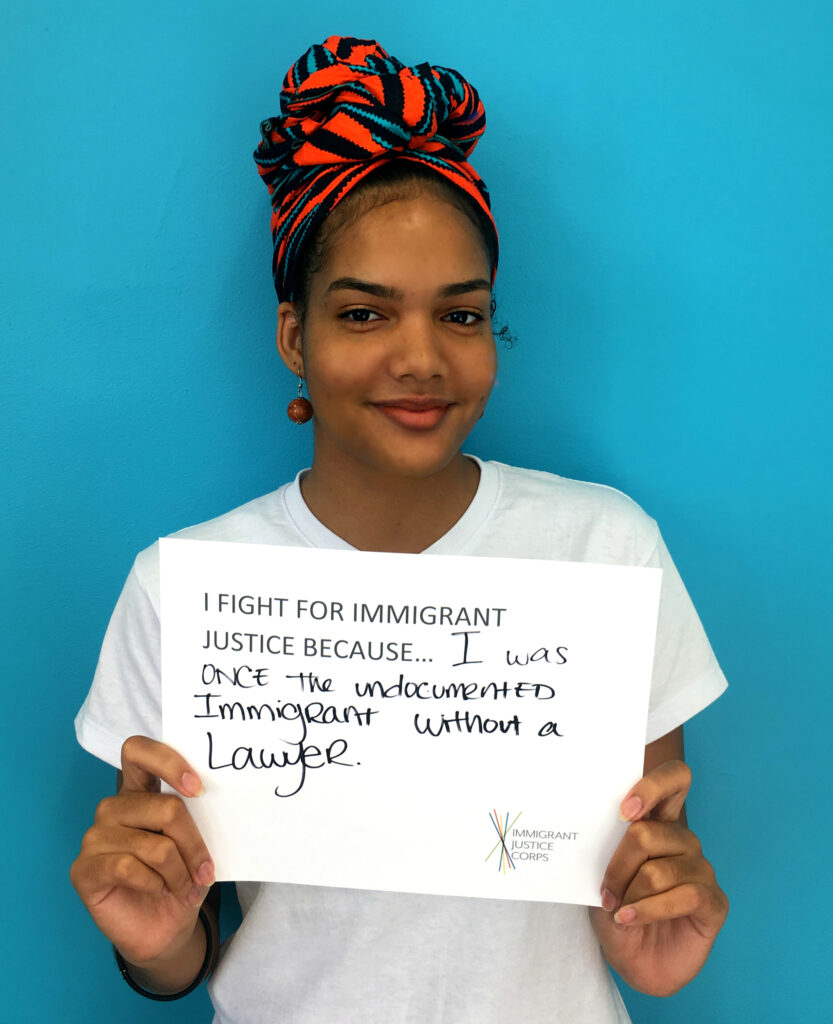Fellow Spotlight: Olivia Page-Pollard
Second-year Justice Fellow Olivia Page-Pollard reflects on the harrowing journey of her client Ana, a survivor of domestic and sexual abuse, who had to wait nearly a decade to obtain asylum in the United States. Four generations of IJC Justice Fellows represented Ana while she waited for her asylum hearing.
In Olivia’s words, this the story of a courageous survivor and the zealous Justice Fellow who represented her:
Ana’s long-awaited asylum hearing in 2022 took place nine years after she fled El Salvador in 2013. She escaped because her brother, a well-connected ex-military man, sexually abused her and threatened her life. When Ana arrived at the U.S. southwest border, officials questioned her about why she feared returning to El Salvador. Ana was too scared to tell them about the abuse, so instead, she said she was gay. She was released from detention and came to New York to attend her immigration court proceedings.
IJC Fellow, Kristen Cates (’15) at Safe Horizon Immigrant Law Project accepted Ana’s case for representation, helped her file her asylum application, and prepared documentary evidence to support her claim. Because Ana was still traumatized, she was not ready to tell her story in court. Kristen therefore requested multiple court adjournments and arranged for her to receive therapy to heal and be able to speak about why she fled El Salvador.
Throughout the years, IJC Fellow Marisol Silva (’17) and later Nicole Medved (’18) represented Ana and continued to collect documentary evidence while she went through therapy. In 2019, Nicole accompanied Ana to court for her asylum merits hearing. After waiting for over two hours the government lawyer informed the court that he did not have Ana’s file. Ana was devastated when the immigration judge adjourned the hearing to July 2020 despite Nicole’s vehement objection.
Immigration courts nationwide closed in March 2020 due to the COVID-19 pandemic. I took over Ana’s case when I began my fellowship in September 2021. I quickly familiarized myself with the case’s legal arguments, declarations, and hundreds of pages of evidence. Before Ana’s new merits hearing, I submitted new legal arguments with updated law and prepared Ana to tell her story.
The day of Ana’s hearing finally arrived on August 30, 2022. A few hours before the hearing, the Immigration and Customs Enforcement (ICE) prosecutor emailed me and asked to start the virtual hearing immediately. Ana was at home, and I did not have her case file. I requested that the hearing start at the scheduled time. An hour later, the immigration judge called to inform me that Ana’s hearing would be adjourned for another year.
I refused to let Ana’s case be pushed back another year. I told the judge that Ana would be devastated if her case was postponed again and that she would testify from her cellphone at home if necessary. The judge agreed to proceed immediately and scheduled the hearing between her other hearings that day. Ana logged into the virtual courtroom from her daughter’s bedroom at home. For two hours we were called off and on into the virtual courtroom to piece together Ana’s testimony.
Ana gave an emotional testimony about the abuse and death threats from her brother, but the hearing ended abruptly because the judge had to leave early. The judge adjourned the hearing for two weeks and cautioned that she may not complete the hearing because of her schedule. Ana felt defeated and exhausted from the disorder of the day. She had waited nine years to tell her story. A cobbled-together hearing from her cellphone was not what she expected. However, I encouraged her to remain confident and strong, assuring her that we would prevail.
The following two weeks passed at a glacial pace. I was frustrated and angry that the court could not give Ana one uninterrupted hour. It was an injustice and a due process violation.
The second hearing day arrived, and after a considerable wait, Ana continued her testimony. Despite attempts by the ICE prosecutor to discredit her testimony, Ana remained consistent and emotional despite the government attorney’s aggressive cross examination.
In her oral decision, the judge expressed concern that Ana had lied to border officials about being gay. I felt my heart sink because it seemed like she was going to deny Ana’s claim.
The judge then stated that she was convinced Ana’s emotional testimony was credible and that her false statement during her border interview was a desperate attempt to avoid deportation to a country in which she would be persecuted. The judge granted Ana asylum on all three legal arguments we, as IJC fellows, had constructed and argued in our briefs and memos throughout nine years of representation. It was an emotional moment for Ana, who had been waiting almost a decade to hear that her future in the United States secure.
The next day, I filed a derivative asylum petition to bring Ana’s teenage son to the United States. He is experiencing gang-threats in El Salvador, and Ana’s asylum grant will bring him to safety. The ICE prosecutor acknowledged that without the massive documentary record compiled by Ana’s legal team, a grant of asylum would never have been possible. Four generations of IJC fellows at Safe Horizon worked alongside Ana to guarantee her safety here in the United States. She now plans to raise her young U.S-Citizen daughter and her teenage son, once he legally migrates from El Salvador, in Brooklyn, New York.
Without competent counsel like Olivia, thousands are deported even though they have viable claims to asylum. IJC Justice Fellows are on the frontlines of the fight to expand access to immigrant justice and to challenge a system that is directly harming immigrant communities.
Want to be a Justice Fellow like Olivia? Click here to attend a Justice Fellowship info session on April 11. Applications for our 2023 Class of Justice Fellows are open until April 28. Apply now!
